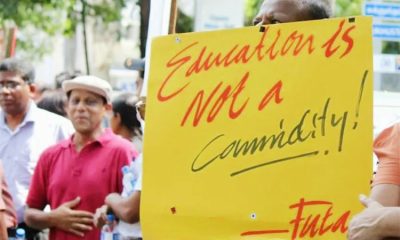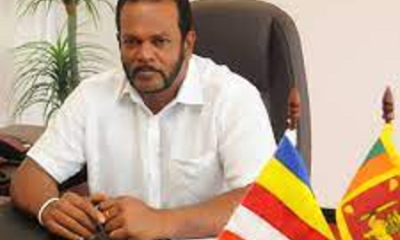Editorial
New laws alone won’t do

Tuesday 7th December, 2021
The government is keen to amend the election laws to provide for restrictions on campaign expenditure, and President Gotabaya Rajapaksa has given the Legal Draftsman necessary instructions in this regard, Media Minister Dallas Alahapperuma has reportedly said. It is hoped that the new laws to be made will also make it mandatory for candidates and political parties to disclose sources of their campaign finance, and the amounts of funds they receive by way of donations.
Laws to regulate campaign finance are long overdue, and the government initiative is therefore welcome. However, one should not be so naïve as to expect all problems related to campaign expenditure, etc., to disappear with the introduction of a few more laws. It is one thing to make laws; it is another to enforce them properly. We already have enough and more laws to prevent election malpractices, but the problem is that they are not applied correctly and fairly.
Politicians are adept at circumnavigating laws and compassing their political ends. When the 19th Amendment was introduced, it was widely expected to enable key state institutions to emerge independent and strong. But the Constitutional Council tasked with depoliticising those outfits became a mere rubber stamp for the Prime Minister, who manipulated it to further the interests of his government. This is the fate that befalls all laws in this country.
The problem with the election laws is not that they lack teeth; instead, it is that the authorities concerned lack the courage to enforce them strictly. The results of several elections, and the 1982 referendum should have been cancelled, given widespread rigging and violence that marred them. What was witnessed before and during the presidential and parliamentary elections in the late 1980s was the very antithesis of democracy; polling agents were chased away and ballot boxes stuffed openly while the police looked on. The North-Western provincial council polls (1999) were also affected by large-scale violence and rigging, but the results were not declared null and void.
Minister Alahapperuma has said the laws to be made will help usher in a new political culture. One should not be faulted for being sceptical about the possibility of such a radical change happening in Sri Lankan politics simply because of a few more additions to the country’s huge body of laws. If the government is genuinely desirous of changing the existing, rotten political culture, it ought to follow Alahapperuma’s example anent electioneering.
The media has been watching Minister Alahapperuma’s election campaigns with interest over the years. He has had the courage to spurn the conventional campaign methods; he does not use posters, banners, bunting, etc. When he chose to swim against the tide and take the high road, not many expected him to succeed in dirty Sri Lankan politics, but he has received a very positive response from the electorate. He has thus been able to keep the cost of electioneering very low. If he can conduct decent polls campaigns under the existing election laws, and get elected, why can’t others? There are several other politicians who also conduct clean election campaigns, and the onus is on the public to appreciate their courage to be different and reward them with votes. Sending the right men and women to Parliament is half the battle in draining the swamp.
It is heartening that the government has realised the need to regulate campaign finance at last and reportedly taken steps to introduce new laws for that purpose. If the SLPP had cared to set an example to others by keeping its campaign expenditure low, it would not have had to go out of its way to scrap duty on sugar imports in a questionable manner, some moons ago, to please one of its main financiers, thereby causing a huge loss to the State coffers. This scam has damaged its image irreparably.
Now that the government has evinced a keen interest in regulating campaign finance, will the ruling SLPP disclose, suo motu, the amounts of funds it received for the 2019 presidential election and the 2020 parliamentary polls, the sources thereof and actual expenditure.
Editorial
Spectre of regional war looms

Saturday 20th April, 2024
The Gaza conflict shows signs of spiralling into a much broader war, which is likely to threaten world peace and destabilise the global economy. Friday’s Israeli missile and drone strikes on the Iranian city of Isfahan, which is said to be home to several nuclear facilities, has pushed the Middle East closer to a devastating regional war. One dreads to think what the situation would be in case of the Iranian nuclear facilities coming under attack. The economic fallout of Friday’s attacks was immediately felt across the globe. World oil prices rallied significantly. So did the gold prices.
The UN has been rendered impotent and the US, together with its western allies, has sided with Israel. So, it is not possible to prevent an escalation of the Israel-Iran conflict; the two belligerent nations are bent on fighting it out.
Washington raises hell if China ever so much as sends a fighter jet over Taiwan, and condemns Beijing in the strongest possible terms for doing so, but it has chosen to remain silent on the Israeli missile attacks on Iran. True, Iran should not have carried out as many as 300 missile and drone attacks on Israel on Sunday. Similarly, Tel Aviv should not have provoked Tehran by attacking the Iranian consulate in Damascus on Sunday. Hamas, which invaded a part of Israel, in October 2023, triggering the ongoing conflict, is now playing the victim card. It is also responsible for the suffering of the Palestinians, whose rights it claims to champion.
Calling for de-escalation of the Middle East conflict, US Secretary of State Antony Blinken has stressed that Washington was not involved in Friday’s attacks on Iran. But he has stopped short of commenting thereon. It may be true that the US had no direct involvement in them, but there is no way Washington can absolve itself of responsibility for what Israel is doing in Gaza as well as elsewhere.
Israel is dependent on Washington to sustain its military operations. The US not only provides military aid to Israel but also defends it at the UN, vetoing as it does the Security Council resolutions calling for a ceasefire in Gaza. It was only after seven World Central Kitchen workers had been killed in an Israel attack, two weeks ago, that US President Joe Biden felt the need to have a ‘come-to-Jesus’ telephone conversation with Israeli Prime Minister Benjamin Netanyahu, who however has not heeded Washington’s concerns.
Worse, the world powers that have taken upon themselves the task of maintaining global peace and protecting human rights, have ignored the ground-breaking International Court of Justice (ICJ) decision in South Africa’s genocide case against Israel, in January. According to experts on international law, the ICJ ruling has formalised legal obligations of all nations that are party to the UN Genocide Convention. But it has apparently had no impact on the US, Canada, etc. There have been no restrictions on arms sales to Israel. The western nations have made a mockery of their commitment to protecting human rights.
The biggest danger to global peace is that the UN has been reduced to a scarecrow, and no powerful nation takes it seriously. The US, Israel and their allies are free to unleash violence to protect their interests. The same goes for Russia. There is no international organisation capable of preventing another world war, which the Gaza conflict might lead to—absit omen.
The western-dominated UNHRC (UN Human Rights Council) demonstrates its selective efficiency. It takes on the nations that the West does not favour but cringes and crawls before the powerful countries and their allies. The UN has outlived its usefulness to all intents and purposes. One can only hope that sanity will prevail, and the world powers will realise the danger of allowing the Gaza conflict to spin out of control, and do everything in their power to rein in Israel and Hamas and eliminate the root causes of the Israel-Palestine conflict.
Editorial
Vroom mania of tub-thumpers

Friday 19th April, 2024
One wonders whether the Parliament of Sri Lanka, which is full of self-righteous members who moralise to the point of queasiness, has taken upon itself the task of serving as a moral compass of sorts for the nation. Its sessions are characterised by endless tub-thumping.
During the past several weeks, Parliament has torn some public officials to shreds over matters related to their salaries and perks, which have since been put on hold pending downward revisions on the grounds that the country is facing its worst-ever economic crisis, and the people are undergoing untold suffering. It has sought to win brownie points with the irate public by censuring the Central Bank officials for ‘misusing their authority’ to grant themselves huge pay hikes. But that is exactly what the MPs themselves usually do; they increase their salaries and allowances and enhance their perks, according to their whims and fancies. Worse, while probing salary issues in the state sector and setting guidelines, Parliament has admitted that it is in the dark about ministerial salaries!
The holier-than-thou MPs are now demanding duty-free vehicle permits, of all things. Who guards the guards? This is the question one asks oneself on reading media reports that the MPs are cranking up pressure on the Speaker and others to issue them with duty-free vehicle permits post-haste.
The government MPs and their Opposition counterparts seldom see eye to eye on virtually anything. They turn parliamentary debates into slanging matches, trade insults and abuse liberally, and, at times, even tuck up their sarongs and set upon one another during stormy debates, but they are always united when they further their interests. They speak with one voice when they demand duty-free vehicle permits, etc., and safeguard their privileges.
Earlier, the MPs who were entitled to duty concessions had to wait for five years to sell their duty-free vehicles. Most of them did not abide by that law, and sold their duty-free permits on the sly, but they did so at the risk of facing legal action in case of being found out. Instead of having that law strictly enforced to prevent the abuse of duty concessions for the MP and others, the Mahinda Rajapaksa government amended it, allowing duty-free vehicle permits to be sold immediately after their issuance! Thus, an unlawful practice came to be legalised.
There is no way Parliament can absolve itself of responsibility for the current economic crisis. It did precious little to prevent the economy from going into a tailspin. Now, it preposterously claims that nobody informed it of the deterioration of the economy! The members of both sides of the House, who bluster ad nauseam, are accountable for what has befallen the economy, which is receiving ICU treatment, so to speak. They must be ashamed of demanding duty-free vehicle permits at this juncture, while asking state workers and the public to be mindful of the country’s economic woes.
The least that the members of the current Parliament can do to assuage public anger, which is welling up and likely to find expression in another mega uprising sooner than expected, is to empathise with the people and share in their suffering. These worthies need to be told that the numerous luxuries they are enjoying at the expense of the public will make their counterparts in the developed world turn green with envy.
As we have pointed out in a previous comment, in Sweden, one of the richest countries in the world, only the Prime Minister is entitled to an official car. The MPs including ministers are given only bus and train passes; they are free to use cars but at their own expense without being a burden on the public. Never do they make demands like the ones the Sri Lankan MPs put forth. It is only in backward countries that politicians are deified and pampered.
Editorial
Rapacious rogues

Thursday 18th April, 2024
Tourist arrivals are on the increase, according to the Sri Lanka Tourism Development Authority. Prestigious international travel guides are very generously promoting Sri Lanka as a must-visit tourist destination. Lonely Planet says ‘endless beaches, timeless ruins, welcoming people, oodles of elephants, rolling surf, cheap prices, fun trains, famous tea and flavourful food make Sri Lanka irresistible’. The New York Times has ranked Negombo as one of the ‘52 Places to Go in 2024’. There have been numerous rave reviews, in international travel publications, about tourist attractions in Sri Lanka. But all it takes to spoil a pot of milk is said to be a smidgeon of cow dung.
A couple of videos doing the rounds on the Internet have exposed some eatery owners’ unspeakably exploitative practices such as overcharging foreign tourists and verbally abusing them. One of them is seen threatening a foreign tourist, who refuses to pay as much as Rs. 1,900 for a kottu roti, in Colombo. He was arrested on Tuesday and released on bail yesterday. The police deserve praise for prompt action.
Eatery owners are not alone in exploiting foreign tourists and hurling abuse at them; some taxi operators also exact exorbitant amounts as fare from unsuspecting foreigners, who are without anyone to turn to. Numerically insignificant as such uncivilised, greedy elements who turn aggressive and abusive at the drop of a hat may be, their sordid operations tarnish the image of the country. This is something that the state institutions tasked with promoting tourism, and all those who are engaged in the hospitality industry ought to take cognizance of.
It must be made mandatory for prices to be prominently displayed in all business places to prevent customers, including foreign tourists, from falling prey to unscrupulous businesspersons. Taxis must not be allowed to operate unless they are equipped with tamper-proof fare meters, and information about their drivers is displayed, as in countries like Singapore. The need for all taxies including trishaws to be strictly regulated to protect the rights of commuters cannot be overemphasised. Ride-hailing companies may be the best option for foreign tourists, who seek hassle-free travel.
Sri Lankans themselves suffer savage exploitation at the hands of rapacious businesses. There are various organisations representing the interests of the business community. They are making multiple demands ranging from debt moratoriums to the suspension of parate executions. They, no doubt, deserve relief and a leg-up to regain stability in these hard times, but they must be mindful of their responsibilities.
It is incumbent upon them to ensure that their members refrain from unethical practices that bring the entire business community into disrepute. They are responsible for the so-called ‘greedflation’, which has caused the prices of commodities and services to remain extremely high despite a significant decrease in the inflation rate.
Business leaders never miss an opportunity to pontificate to politicians about the virtues of transparency, integrity, etc., but shouldn’t they put their house in order before being critical of others. The rupee has been rallying against the US dollar, during the past several weeks, and the cost of production has decreased significantly, but the prices of essential commodities are increasing. Eatery owners and bakers are among those who are making a killing at the expense of the public.
The Consumer Affairs Authority is in a deep slumber, as is its wont, and it must be shaken awake and made to carry out its duties and functions diligently. It needs a radical shake-up, for some of its officials are believed to be compromised. Its much-publicised raids have stopped and traders are exploiting the public with impunity. The victims of fleecing have no alternative but to suffer in silence, and foreign travellers’ predicament is even worse for obvious reasons.
The government spends colossal amounts of state funds on tourism promotion events overseas. While such gimmicks may be necessary to attract tourists, many issues remain unaddressed at home. There is a pressing need to take stringent action against the rapacious rogues preying on foreign tourists and Sri Lankans alike.
-

 Business2 days ago
Business2 days agoCEAT Kelani launches 3 new radial tyre variants in ‘Orion Brawo’ range
-

 Business3 days ago
Business3 days agoSOEs seen as failing SL’s ordinary citizens
-

 News4 days ago
News4 days agoSay no to NEPF! Say no to abolishing free education!
-

 Business2 days ago
Business2 days agoDialog-Airtel Lanka merger comes centre stage
-

 Midweek Review3 days ago
Midweek Review3 days agoBetween abstraction and empathy in Sarath Chandrajeewa’s visual paraphrases
-

 Business2 days ago
Business2 days agoSLFEA appoints JAT as a Facilitation Partner for training painters to provide overseas employment opportunities
-

 Latest News4 days ago
Latest News4 days agoFormer Member of Parliament Palitha Thewarapperuma passes away
-

 Business3 days ago
Business3 days agoSri Lanka Tourism concludes another round of Roadshows in Australia



























